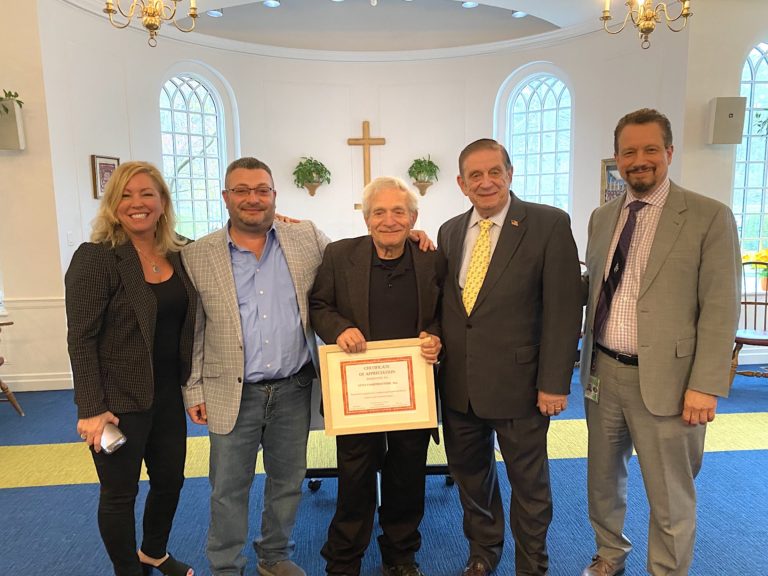By The Rev. Marek Zabriskie
Every summer I try to hike one of the trails that run like a veins through Europe and lead to Santiago de Compostela in Spain, where St. James the Greater (or Santiago in Spanish) is said to lie buried. They are all part of the Camino of Santiago de Compostela.
I begin by thinking about what needs to go in my backpack weeks before my trip. Hikers are encouraged to carry no more than 10 percent of their body weight in their backpack.
The pack may weigh three pounds. Inside it, you might carry a water bladder with three pounds of water. You add a lightweight sleeping bag, toiletries, two walking sticks, shirts, pair of shorts, pair of socks, pair of underwear, a lightweight rain jacket, something warm to wear on a cool evening and perhaps a book to read. That’s it.
There is a joy to simplifying our lives and realizing how little we need to be happy. For a few weeks, I feel free and unencumbered. I think of the explorer Richard Byrd, who after months alone in the frozen artic, wrote in his journal, “I am learning… that a man can live profoundly without masses of things.”
When Jesus appointed seventy followers to go ahead of him into every town where he intended to visit and preach, he said, “carry no purse, no bag, no sandals…” In other words, “travel lightly.” Rely on the hospitality of others. Let life surprise you. God will watch over you.
Perhaps there’s no coincidence that in order to serve Jesus, simplicity was required. They took just the bare essentials. Indeed, the more we possess and complicate our lives, the harder it is to experience God, peace and joy.
All of us came into the world with nothing and will depart this world with nothing. One of life’s most important spiritual lessons to learn is learning how to travel lightly through life.
Simplicity is rarely mentioned as a spiritual discipline. It is hard to message to live and share in wealthy communities like ours. But it is vital for Christian living. In his book Celebration of Disciple: the Path to Spiritual Growth, Richard Foster notes that “the Christian discipline of simplicity is an inward reality that results in an outward lifestyle.”
The things that we accumulate can complicate our lives and separate us from God. Riches are deceitful precisely because they lead us to trust in them. We inhabit a very material world, where someone famously said, “We buy things that we do not want to impress people that we do not like.” The last thing that we want is to be out of fashion.
But the preacher of Ecclesiastes writes, “God made man simple; man’s complex problems are of his own devising” (Eccles. 7:30). Simplicity brings freedom and joy. Christian writers like St. Augustine, St. Francis, Blaise Pascal, Richard Baxter, John Wesley and Joan Chittester have all written about it. The famous Shaker hymn reminds us:
Tis the gift to be simple,
Tis the gift to be free,
Tis the gift to come down where you ought to be,
And when we find ourselves in the place just right,
Twill be in the valley of love and delight.
The hymnist goes on to write,
When true simplicity is gained,
To bow and to bend we shan’t be ashamed.
To turn, turn will be our delight
Till by turning, turning we come round right.
The key is “to turn” from a life encumbered by too much stuff, too much pressure, and too much complexity to something simpler and more manageable. How often we try to pack 80 pounds of life into our 20 pound backpack of life. We live with a constant fear of missing out if we don’t attend something, buy something, try something, do something, or say something.
To be transparent, I struggle with this myself. More than anyone else in our family, I overpack, and I run constantly late by trying to do one more thing.
We ask ourselves, “How can I get more?” But the Christian spiritual seeker asks, “What can I do without?” We ask ourselves, “How can I find myself?” The spiritual seeker asks, “How can I lose myself?” We ask, “How can I win friends and influence people?” The spiritual seeker asks, “How can I love God?”
“To be simple,” writes Dietrich Bonhoeffer, is to fix one’s eye solely on the simple truth of God at a time when all concepts are being confused, distorted and turned upside down. It is to be single hearted.” That is our challenge today.
It is also why Jesus challenged the rich young ruler to give what he had to the poor, because not only did he have great possessions, but more significantly his possessions had him. Jesus noted that wherever we fix as our treasure, there our heart, mind and soul will be focused.
One of the challenges of living the gospel in communities like Greenwich is that many of us lead lavish lifestyles. Some have personal trainers, a second or third home, expensive cars, lovely vacations, private schools, and memberships at clubs. It’s a wonderful life, but it’s not a Christian life if we only give our leftovers to God – our leftover time, leftover talent, and leftover money.
When we do this, we risk reducing God to an accoutrement in our lives and leaving a church too weak to transform any lives including our own. By avoiding simplicity, we conveniently ignore much of Jesus’ teaching and miss the peace and joy of Christian living.
Simplicity is about more than having fewer material possessions. The simple person is humble, puts on no airs, requires no special attention, does not dominate conversations, but rather lives quietly, responsibly, and seldom requires the best of anything, let alone of everything.
The higher a person goes up the ladder of wealth and success the harder it is to find simple people. Richard Rohr notes that “protocol takes over.” People act in affected ways, feel entitled to receive things, and long to display signs of their success.
To be happy means to be content with what we already have, be in touch with our spiritual selves, and to connect deeply with family and friends, and do some good in this world.
Meister Eckhart wrote some 700 years ago, “God is not found in the soul by adding anything but by subtracting.” It’s a different kind of math than the math of accumulation and acquisition that we have been taught, but it is the math of eternal peace and joy.
The Rev. Marek P. Zabriskie is the Rector of Christ Church Greenwich and has walked over 1,500 miles on pilgrimage trails across Spain.




